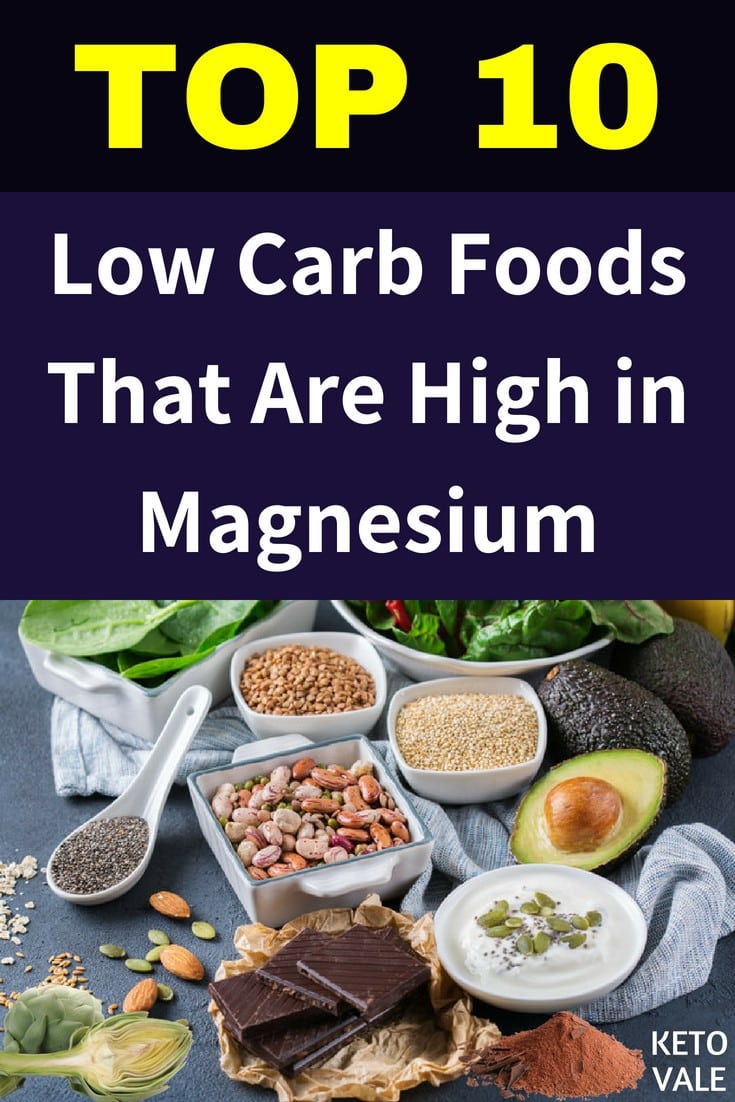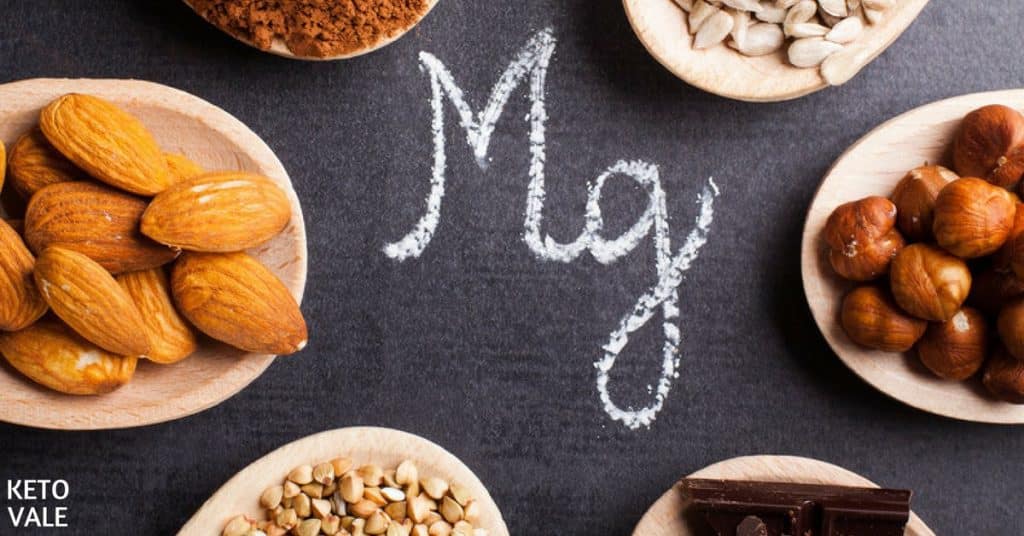You have probably already heard how important electrolytes are when doing keto (if you haven’t, check out our article on this topic), and one of them is magnesium. It’s essential to make sure you’re getting enough of it, and there are a number of low-carb foods that can help you with that.
What Does Magnesium Do?
Magnesium is one of the essential minerals that contribute to the proper functioning of your body and is extremely important for your overall health. It helps your body maintain a healthy brain. It also aids in muscle function, keeps your heartbeat stable and steady, and plays a role in the processes involved in energy production and protein synthesis (1).
A magnesium deficiency can manifest itself in a number of ways, but some of the most common symptoms are the following:
- Muscle cramps
- Fatigue and weakness
- Arrhythmia (irregular heartbeat)
- High blood pressure.
Magnesium has also been shown to help improve migraines and headaches, due to its calming role in the central nervous system (2). Over 300 enzymes require magnesium ions to carry out important roles in the body, including the synthesis of ATP. Therefore, magnesium is required for proper energy levels.
Magnesium is also beneficial for promoting regularity and relieving constipation as it can be used as a laxative (3). For this reason, it’s best to start with small amounts of magnesium and work your way up if you choose to supplement with it.
Many people supplement with magnesium on keto, as electrolytes are flushed from your system at a higher than normal rate, but magnesium from the food you eat plays an important role in electrolyte balance.
Related: Best Form of Magnesium
What Foods Are Highest in Magnesium?
There are plenty of low-carb foods that are a good source of magnesium. Here’s our selection of the best ones that you can add to your diet plan.
#1. Almonds
A serving of 1 oz / 28 g of almonds (i.e. around 20-23 whole kernels) is packed with 75 mg of magnesium, which provides almost 20% of your daily needs. It comes at 162 calories and only 2.7 g net carbs.
In addition to that, almonds contain lots of manganese and vitamin E, and are a great source of antioxidants, which are found in the almond’s skin, so it’s the best to not peel it off.
Almond milk might also be a decent source of magnesium – check the label for the exact amount per serving, as the values will vary between the different brands.
Also, be sure your almond milk does not contain harmful ingredients, such as added sugars or carrageenan.
#2. Cashew Nuts
While cashew nuts are a bit higher in carbs than almonds (a 1 oz / 28 g serving of them contains 8.3 g net carbs), you can still find a place for them in your diet by moderating your consumption. This amount contains 155 calories, and 81.8 mg of magnesium, which is plenty.
Cashew nuts are a good source of copper and iron, which help your body produce new red blood cells, and are, therefore, beneficial for your blood vessels and immune system.
#3. Brazil Nuts
One ounce (28 g) of Brazil nuts, which is approximately 6 kernels, contains a very high amount of magnesium, 106 mg, and plenty of healthy fats. They’re very low in carbs – only 1.4 g net carbs, but because of their high-fat content, they are quite caloric – 185 calories per ounce.
If you can make room for them, they’ll also provide you with good levels of zinc, calcium, vitamin E and antioxidants. Moreover, they are heart-protective and have been shown to lower the risk of cardiovascular disease.
#4. Flaxseed
The tiny flaxseed has plenty of amazing health benefits, such as improving digestion, lowering blood pressure, reducing the risk of some cancers, and more.
In addition to all of these, 1 tablespoon (7 g) of ground flaxseed contains 27.4 mg of magnesium, which is plenty for such a small amount, and has 37 calories and only 0.1 g net carbs – pretty amazing, right?
Moreover, flaxseed is a good source of phosphorus, copper, manganese, and fiber. So if you haven’t added it to your diet yet, give it a try.
#5. Cocoa and Dark Chocolate
Cocoa, the main ingredient in dark chocolate, contains lots of antioxidants. It even scores higher than tea. Consuming dark chocolate in moderate amounts has been shown to be heart-protective and mood-enhancing, so there’s no reason to fear it (4, 5, 6).
The magnesium contained in dark chocolate is of approx. 17 mg per 10 g square, while the carbs and calories will vary, depending on the brand. Avoid milk and white chocolate, which are very high in carbs and sugar, and opt for chocolate that is 85% cocoa or more.
#6. Artichokes
Artichokes are somewhat less popular, but are an amazing food nevertheless, and are rather low in carbs. One medium boiled artichoke (of approx. 120 g) contains about 50 mg magnesium and 63 calories.
Its carb content is of 4 g net carbs, while at the same time it’s very high in dietary fiber, which is important for your digestive health – 10.3 g per serving. They contain lots of antioxidants, folate, and vitamins C and K.
#7. Salmon
Salmon is an excellent food for keto – half a filet of raw wild salmon (of 200 g approximately) contains no carbs, 40 g protein, and 13 g fat.
Salmon is good for you in plenty of different ways – besides being an excellent source of omega 3 fats, it is also a very good source of magnesium – 58 mg per serving. It also contains vitamins B6, B9, and B12, as well as selenium and potassium.
#8. Spinach
Spinach is truly one of keto’s stars – it’s very low in net carbs: 1.4 g net carbs in a serving of 100 g of raw spinach and in calories (23 per 100 g) while being loaded with a number of important micronutrients. Magnesium is one of them, at 79 mg per serving, which is great news for all ketoers who love spinach.
Additionally, it is a great source of potassium, vitamin K, vitamin C and folate, which all make it a very nutritious and healthy food.
#9. Swiss Chard
Swiss chard is another green leafy vegetable that has a number of merits. One hundred grams of it contains only 19 calories, 2.1 g net carbs and 81 mg of magnesium. You could sautée it with garlic for an excellent side dish.
Similarly to spinach, it’s a great source of vitamins C and K, as well as of potassium and dietary fiber. If you haven’t tried it yet, don’t hesitate to grab some the next time you see it in the supermarket!
#10. Avocado
Avocados seem to be one of the most popular foods in the low-carb community nowadays, and for a good reason – they contain plenty of good fats, 15 g for a serving of half an avocado (approx. 100 g / 3.5 oz), and only 2 g net carbs (and 7 g fiber), as well as plenty of important micronutrients, such as magnesium (29 mg of it), potassium, copper, iron and folate.
Conclusion
Magnesium plays many important roles in the body, including central nervous system support and ATP synthesis. It’s required by more than 300 enzymes and can be used to relieve constipation and headaches, and support proper energy levels.
While nuts are an amazing source of magnesium, keep in mind that if your goal is weight loss, it’s very important to measure and track them properly, as they’re very calorically dense.
If you’re in maintenance mode and if they don’t provoke any adverse reactions in you (in the form of allergies or intolerances), there’s absolutely nothing wrong with consuming nuts, but you’re currently trying to lose weight, we advise sticking to the other magnesium-rich foods that you see listed above.
It’s always best to get your micronutrients from whole food, and you have a number of great options, but if you notice that your magnesium is low, you might still want to consider supplementing.
Up Next: Top Low-Carb, High-Fiber Foods for Keto
Enjoy this list? Save to your Pinterest for later use!








